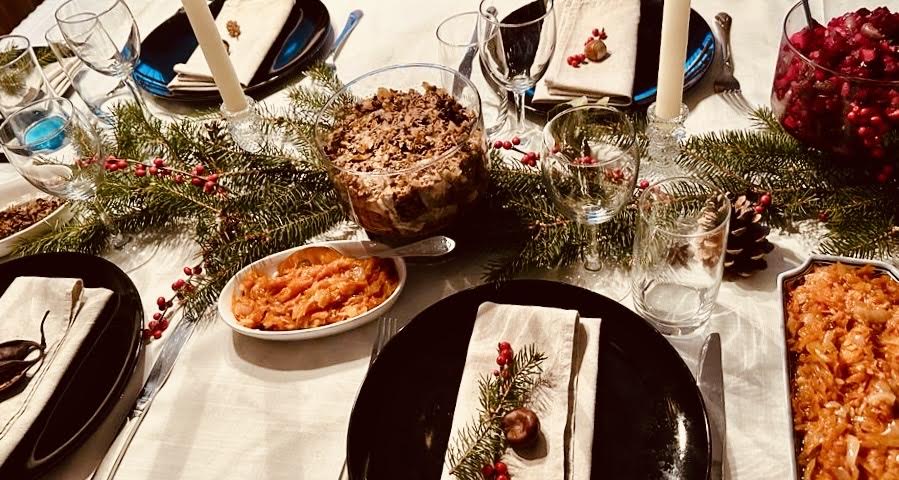A few would argue Christmas being the most charming holiday of the year. And even though this beautiful festivity has been strongly coca-cola’ized around the globe, certain countries and cultures still hold their unique traditions. Let me tell you about my tradition – Christmas in Lithuania.
Preserving Pagan Roots: The Last Bastion of Paganism in Europe
Did you know that Lithuania was the last bastion of paganism in Europe, holding back Christian crusaders all the way until 1387? This delay in conversion allowed the nation to preserve its rich pagan traditions, which seamlessly integrated with Christian customs. As a result, Lithuanian Christmas celebrations offer a captivating blend of ancient rituals and Christian elements.
Kūčios: A Symbolic Feast of Twelve Dishes
One of the most cherished traditions in Lithuania is the festive dinner held on Christmas Eve, known as “Kūčios.” This special evening brings families together to share a meal that goes beyond mere sustenance; it’s a symbolic and cultural experience. The dinner typically consists of twelve traditional dishes, and this is where paganism once again meets Christianity.
According to Baltic paganism, each dish represents one month of the year. This practice is a nod to the cyclical nature of time, connecting the feast with the passage of the seasons. Whilst according to Christian tradition, each dish represents one of the 12 disciples. Dishes are placed at the centre of the table and it is a must to try all of them, for good luck.

Tablecloth, Hay, and Fortune-Telling: Charms of Christmas in Lithuania
Family sits around the table that is adorned with a white tablecloth, symbolising purity. Hay is placed under the tablecloth, it symbolises nativity – baby Jesus’ birth place. After dinner, a tradition of fortune telling will take place as every guest picks one straw from underneath the cloth.
Fortune-Telling with Straw: Insights into Romantic Futures
The characteristics of the chosen straw, such as its length, thickness, or other unique features, are then interpreted to reveal insights into the individual’s (mostly romantic) future. For example, a long and straight straw might symbolise a fortunate and prosperous marriage, while a bent or twisted straw could suggest challenges or twists in one’s love life.
The Christmas Eve Menu: Vegan and Pescatarian Delights
The Lithuanian Christmas Eve dinner holds a vegan and pescatarian tradition, rooted in both religious and cultural influences. The observance of Advent, a period of fasting and reflection leading up to Christmas, plays a significant role. Traditionally, Lithuanians abstain from meat, dairy, and other animal products during this time, creating a menu that aligns with vegan and pescatarian dietary practices.
Sweet Traditions: Kūčiukai and Kisielius
Among the array of dishes featured in the Christmas Eve spread, “kūčiukai” take a prominent place. These small, sweet pastries made from leavened dough are often accompanied by poppy seeds and honey. “Kūčiukai” are not only a delicious treat but also hold deep cultural significance, representing prosperity and good fortune for the coming year.
Another staple of the Lithuanian Christmas Eve dinner is “kisielius,” a traditional starchy drink. Made from either oats or various berries, particularly cranberries or bilberries, this dessert adds a burst of colour and flavour to the festive table. “Kisielius” symbolises the joy and abundance associated with the Christmas season.
Herring Royalty: The Queen of Lithuanian Christmas Eve
Herring is the queen of Lithuanian Christmas Eve dinner. Served in many different sauces and accompanied by numerous garnishes, this poor Baltic fish shines in all its colours during this festivity.
Beyond Food: Family, Reflection, and Gratitude
In Lithuania Christmas Eve dinner is not solely about the food; it is a time for family, reflection, and gratitude. In the face of a significant population decline in this small Baltic nation, primarily attributed to emigration over the past decades, Christmas plays a beautiful role in bringing families together.
Remembering Absent Loved Ones: The Empty Seat Tradition
An empty seat is left at the table for those who are absent or have departed in the past year. It is a touching way to remember family members who are no longer with them. It is also very common to leave food on the table for the whole night after dinner, so that the spirits can enjoy it once everyone is asleep.

Leave a Reply